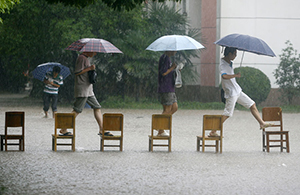Room for negotiation
(China Daily) Updated: 2012-12-11 07:50
The world community was relieved to hear the Democratic People's Republic of Korea announce on Saturday that it was changing the window for its scheduled satellite launch. But the situation took an abrupt turn on Monday when the country said it will launch the satellite before Dec 29.
It is a pity that an opportunity that would have been conducive to easing the tensions that have built up since Pyongyang revealed its launch plan earlier this month has been lost so soon.
Pyongyang originally planned to launch a new version of the Kwangmyongsong 3 satellite by the Unha 3 carrier rocket between Dec 10 and 22, following a failed attempt in April.
Japan, the Republic of Korea and the United States have said they would respond in various ways, as they claim the satellite launch is a cover for testing long-range missile technology.
Under relevant United Nations Security Council resolutions, the DPRK is prohibited from conducting launches that use ballistic missile technology.
When Pyongyang failed to send a satellite into orbit in April, the council made it clear in a statement that it considers any DPRK launch that uses ballistic missile technology a violation of the relevant resolutions.
Pyongyang is entitled to the peaceful use of the space and insists that it is launching a satellite. But the wave of warnings and criticism directed at it this month indicates its second launch attempt this year could trigger a new round of tensions.
Pyongyang's latest decision on the launch window may hardly be deemed as a compromise, but it still makes a difference as the launch window is postponed until after the general election in Japan on Saturday and the presidential election in the ROK on Dec 19.
There is still time, and room, for diplomatic mediation before Dec 29. And the best way to maintain peace and stability on the Korean Peninsula is to undo the knot of tensions, not tie it tighter. The countries concerned should step up mediation efforts for a favorable turn in events. The Six-Party Talks, which involve China, the US, Russia, the DPRK, the ROK and Japan, could be a useful platform for such efforts.
As some of the participating countries of the multilateral framework have either undergone, or are going to undergo a political transition, there is a chance for the parties concerned to recalibrate their attention on restarting the talks and show greater commitment to returning to the negotiating table.
(China Daily 12/11/2012 page8)












